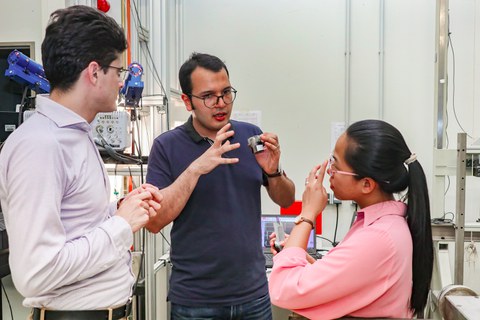May 26, 2021
Research for more resistant buildings: DFG extends funding of TUD graduate school

Participants inside the GRK 2250 for the summer school 2018 in the textile machine laboratory of the TU Dresden
GRK 2250 "Impact safety of building structures through mineral-bound composites" will be financed for another 4.5 years
Four years after the start of the first structured doctoral studies in the School of Civil and Environmental Engineering at the TU Dresden, the funding of the second project phase of the GRK 2250 program for the 4.5-year funding period has now been decided by the grant committee of the German Research Foundation (DFG). Graduate colleges are special programs at universities to promote young academics, which are funded by the DFG for a maximum of 9 years. The focus is on the qualification of doctoral students as part of a thematically focused research program and a structured qualification concept. An interdisciplinary orientation of the research training groups is expected. The aim is to prepare doctoral candidates intensively for the complex “science” job market and at the same time to support their early scientific independence.
The Institute for Construction Materials of the TU Dresden is in charge of the strongly internationally influenced and respected GRK 2250. With their research projects, a total of 25 doctoral students are working on possible solutions to make existing buildings and structures significantly more resistant to short-term dynamic loads by applying flat, thin-layer reinforcements; because existing constructions made of concrete or reinforced concrete usually have a relatively low resistance. "In view of the ever increasing risk of short-term dynamic stresses occurring, e.g. due to natural disasters or detonations, there is an urgent need for action worldwide with regard to ensuring the safety of people and the infrastructure that is important for people's lives," said Prof. Viktor Mechtcherine, spokesman of GRK 2250 at the beginning of the program in 2017.
Numerous doctoral and postdoc projects were successfully implemented in the first funding phase, which will run until September 2021. Impact-resistant, mineral-bound composites with different fiber reinforcements were developed, characterized and modeled. At the same time, application and construction concepts as well as calculation bases for the reinforcement of existing concrete structures with thin layers of highly ductile composite materials were developed. Suitable testing and evaluation methods have been developed for the processes that take place during impact, such as expansion wave propagation and rapid deformation and fracture processes. In addition, new approaches and methods for the numerical simulation of the behavior of impact-stressed new composites and concrete structures with coupling of different space and time scales were implemented.
Highly ductile concretes (SHCC), textile reinforcements and hybrid composite materials made from short and "endless" fibers have proven to be particularly promising as materials for increasing impact safety.
Accordingly, an important part of the research is the development and application of a comprehensive material design concept with the aim of developing ecologically and economically sustainable solutions. The simultaneous improvement of the rheological properties should enable a mechanical, largely automated processing of the fiber concrete comparable to the 3D printing of concrete. https://www.grk2250.de
Information for Journalists:
Prof. Viktor Mechtcherine
Institute for Construction Materials at TU Dresden
Tel.: 0351 463-36311
